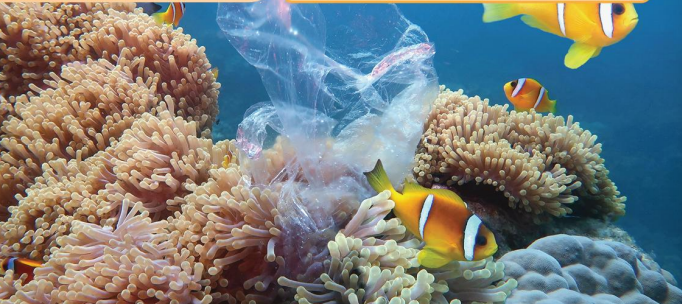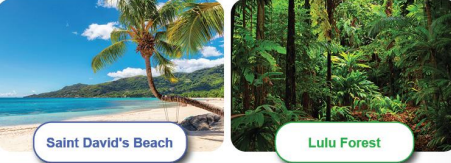Đừng bỏ lỡ những tính năng hấp dẫn của Baitap365.com
In pairs: Look at the picture. What can you see? What causes problems like this? a. Read the words and definitions, then fill in the blanks. Listen and repeat. b. In pairs: Use the new words to talk about some of the problems that natural wonders have.
Let's Talk!
In pairs: Look at the picture. What can you see? What causes problems like this?
(Theo cặp: Quan sát tranh. Bạn có thể nhìn thấy cái gì? Điều gì gây ra vấn đề như thế này?) 
New Words - a
a. Read the words and definitions, then fill in the blanks. Listen and repeat.
(Đọc các từ và định nghĩa, sau đó điền vào chỗ trống. Lắng nghe và lặp lại.)
• litter: leave trash in the wrong place, e.g. on the floor, in water, etc.
• fine: make somebody pay money because they did something wrong
• consider: think about something carefully before you make a decision
• spoil: change something good into something bad
• disturb: move something or change its position
• hunt: catch or kill wild animals
• ranger: a person who takes care of a park, a forest, or an area in the country
• government: the group of people who make the rules and decide what happens in a country
1. People sometime hunt animals in national parks because they can sell them for a lot of money.
(Đôi khi người ta săn bắt động vật ở các công viên quốc gia vì họ có thể bán chúng với giá rất cao.)
2. When we met the ______, he told us not to start any fires in the forest he looks after.
3. If you do something bad, the police might ______ you, and you'll have to pay some money.
4. If companies build too many hotels, they will ______ the beach, and people won't visit it anymore.
5. The ______ wants to make a new law to reduce the country's air pollution.
6. You should never ______. You should always put your trash in a trash can.
7. I decided not to go to university, but I did ______ going for a long time.
8. Don't ______ any plants or animals when you visit a natural wonder. You shouldn’t touch or move the plants or animals.
New Words - b
b. In pairs: Use the new words to talk about some of the problems that natural wonders have.
(Theo cặp: Sử dụng các từ mới để nói về một số vấn đề mà kỳ quan thiên nhiên gặp phải.)
People often litter in national parks.
(Người dân thường xả rác ở các công viên quốc gia.)
Listening - a
a. Listen to three teens talking about a problem in their favorite place. Whose idea do they like the most?
(Nghe ba thanh thiếu niên nói về một vấn đề ở địa điểm yêu thích của họ. Họ thích ý tưởng của ai nhất?)
1. Debbie's idea
2. Donald's idea
3. Dorothy's idea
Listening - b
b. Now, listen and fill in the blanks.
(Bây giờ hãy nghe và điền vào chỗ trống.)
1. The teens find a lot of trash near the waterfall.
(Các thiếu niên tìm thấy rất nhiều rác gần thác nước.)
2. Debbie says that the trash will spoil the ______ of the park.
3. Donald thinks that rangers should fine people who ______ in the park.
4. Dorothy thinks that the rangers should give ______ to everyone who visits the park.
5. Debbie wants the government to put more ______ in the park.
Listening - c
Conversation Skill
Politely disagreeing
To disagree politely, say:
☐That's not a bad idea, but...
☐I understand what you're saying, but...
(Kỹ năng giao tiếp
Không đồng ý một cách lịch sự
Để không đồng ý một cách lịch sự, hãy nói:
☐ Đó không phải là ý kiến tồi, nhưng...
☐Tôi hiểu bạn đang nói gì, nhưng...)
c. Read the Conversation Skill box, then listen and repeat.
(Đọc hộp Kỹ năng hội thoại, sau đó nghe và lặp lại.)
Listening - d
d. Now, listen to the conversation again and number the phrases in the correct order.
(Bây giờ, hãy nghe lại đoạn hội thoại và đánh số các cụm từ theo đúng thứ tự.)
Listening - e
e. In pairs: Who do you think had the best idea? Why?
(Theo cặp: Bạn nghĩ ai có ý tưởng hay nhất? Tại sao?)
Grammar - a
a. Read about verb + gerund, then fill in the blanks
(Đọc về động từ + gerund, sau đó điền vào chỗ trống)
Verb + gerund
We can use a gerund after some verbs
• like, don't mind, hate, enjoy, love, prefer, dislike to express a general preference
I like bringing food to the park, but I always clean up.
We don't mind going off the path, but we're always careful not to damage anything.
• keep, stop, avoid, consider, suggest, deny, finish, spend (time), etc.
If people keep littering, the river will be really dirty.
People need to stop hunting wild animals.
Tạm dịch
Động từ + danh động từ
Chúng ta có thể sử dụng danh động từ sau một số động từ
• thích, không bận tâm, ghét, thích, yêu, thích, không thích để thể hiện một sở thích chung
Tôi thích mang đồ ăn đến công viên nhưng tôi luôn dọn dẹp.
Chúng tôi không ngại đi chệch hướng, nhưng chúng tôi luôn cẩn thận để không làm hỏng bất cứ thứ gì.
• giữ, dừng, tránh, xem xét, đề nghị, từ chối, kết thúc, dành (thời gian), v.v.
Nếu người dân cứ xả rác thì dòng sông sẽ rất bẩn.
Mọi người cần ngừng săn bắt động vật hoang dã.
A: What can we do to (1) _____ littering?
B: People should (2) ______ food and drinks to the park.
Grammar - b
b. Listen and check. Listen again and repeat.
(Nghe và kiểm tra. Nghe lại và lặp lại.)
Grammar - c
c. Write sentences using the prompts.
(Viết câu sử dụng gợi ý.)
1. I/not mind/play/music/park. I/think/nice
I don't mind playing music at the park. I think it's nice.
(Tôi không ngại chơi nhạc ở công viên. Tôi nghĩ nó rất hay.)
2. I/hate/litter. It/spoil/natural beauty/beach
_________________________________
3. People/need/stop/cut down/trees
_________________________________
4. If/companies/keep/pollute/water,/it/harm/fish
_________________________________
5. People/should not/keep/use/plastic bags/because/they/create/lots of trash
_________________________________
6. How/can/we/get/people/stop/disturb/wildlife?
_________________________________
7. If/people/keep/litter,/park/become/dirty
_________________________________
8. People/need/avoid/break/rules/or/they/should/get/fine
_________________________________
Grammar - d
d. Complete each sentence using a verb and a gerund/noun from the box.
(Hoàn thành mỗi câu bằng cách sử dụng một động từ và một danh động từ/danh từ trong khung.)
Verbs:
|
• don't mind |
• keep |
• enjoy |
• hate |
• consider |
• stop |
Gerunds/Nouns:
|
• littering |
• building |
• bringing |
• feeding |
• going |
• hunting |
1. I enjoy bringing lunch to the beach, but I never litter.
(Tôi thích mang bữa trưa ra bãi biển nhưng tôi không bao giờ xả rác.)
2. If people _________ in the river, we won't be able to go fishing there.
3 I _________ off the path. You can find cool places for photos, but you have to be very careful not to damage anything.
4 I _________ animals. Why would people want to harm them?
5. Do you think we should _________ the wildlife? Some people think it's cute, but it's actually bad for the animals’ health.
6. The government should _________ something aroud the national park to keep hunters out.
Grammar - e
e. In pairs: Use the prompts to say how you feel about doing the actions below at natural wonders, then give a solution.
(Theo cặp: Sử dụng gợi ý để nói cảm nghĩ của bạn khi thực hiện các hành động dưới đây tại các kỳ quan thiên nhiên, sau đó đưa ra giải pháp.)
|
• love/have picnics • hate/hunt animals
• don't mind/follow park rules
|
• people/consider/bring/trash bag • government/stop/hunt/animals/by/fine hunters
• rangers/consider/make/more signs
|
I love having picnics. People should consider bringing trash bags.
(Tôi thích đi dã ngoại. Mọi người nên cân nhắc việc mang theo túi rác.)
Pronunciation - a
Intonation (Ngữ điệu)
a. Intonation for contrasting sentences falls, then rises, then falls again.
(Ngữ điệu của các câu đối lập giảm xuống, rồi lại tăng lên, rồi lại giảm xuống.)
I want to help my community⇘, but I don't know⇗ what to do⇗.
(Tôi muốn giúp đỡ cộng đồng của mình⇘, nhưng tôi không biết⇗ phải làm gì⇗.)
Pronunciation - b
b. Listen to the sentences and notice how the intonation falls, then rises, then falls again.
(Hãy nghe các câu và chú ý cách ngữ điệu xuống, rồi lại lên, rồi lại xuống.)
That's not a bad idea, but I think the police are too busy to work in the national park.
I understand what you're saying, but people already litter here.
Pronunciation - c
c. Listen and cross out the sentence that doesn't follow the note in Task a.
(Nghe và gạch bỏ câu không theo ghi chú ở bài tập a.)
It's a good idea, but most people won't like it.
Lots of people help, but others don't do anything to help.
Pronunciation - d
d. Read the sentences with the intonation noted in Task a. to a partner.
(Đọc các câu có ngữ điệu được ghi ở Bài tập a. cho một người bạn.)
Practice - a
a. In pairs: Take turns asking and answering about how you feel about the actions and suggesting solutions, then politely disagree and give the next solution.
(Theo cặp: Lần lượt hỏi và trả lời cảm nhận của bạn về hành động đó và đề xuất giải pháp, sau đó lịch sự không đồng ý và đưa ra giải pháp tiếp theo.)
A: How do you feel about having picnics at the beach?
B: I don't mind having picnics, but they can cause littering.
A: Yeah. That's why people should stop bringing food.
B: That's not a bad idea, but I think...
(A: Bạn cảm thấy thế nào khi đi dã ngoại ở bãi biển?
B: Tôi không ngại tổ chức dã ngoại, nhưng chúng có thể gây ra tình trạng xả rác.
A: Vâng. Đó là lý do tại sao mọi người nên ngừng mang theo thức ăn.
B: Đó không phải là một ý tưởng tồi, nhưng tôi nghĩ...)
|
Actions |
Problems |
Possible Solutions |
|
Having picnics |
Cause littering |
• people - stop bringing food • government - consider adding more trash cans • rangers - not keep letting people have picnics
|
|
Having group tour |
Damage rock formations |
• people - stop touching them • government - keep building more fences • government - consider limiting tour sizes |
|
Exploring on your own |
Disturb the nature |
• rangers - not keep letting people explore on their own • people - stop going off paths • government - consider fining people who disturb wildlife |
Tạm dịch
|
Actions (Hành động) |
Problems (Vấn đề) |
Possible Solutions (Phương pháp khả thi) |
|
Having picnics (Đi dã ngoại) |
Cause littering (Gây ra xả rác) |
• people - stop bringing food • government - consider adding more trash cans • rangers - not keep letting people have picnics (người dân - ngừng mang theo thức ăn • chính phủ - xem xét bổ sung thêm thùng rác • kiểm lâm - không tiếp tục cho người dân đi dã ngoại) |
|
Having group tour (Có chuyến tham quan theo nhóm) |
Damage rock formations (Phá hủy các khối đá) |
• people - stop touching them • government - keep building more fences • government - consider limiting tour sizes (• con người - ngừng chạm vào chúng • chính phủ - tiếp tục xây thêm hàng rào • chính phủ - xem xét giới hạn quy mô chuyến tham quan) |
|
Exploring on your own (Tự mình khám phá) |
Disturb the nature (Làm xáo trộn thiên nhiên) |
• rangers - not keep letting people explore on their own • people - stop going off paths • government - consider fining people who disturb wildlife (• kiểm lâm - không tiếp tục để mọi người tự mình khám phá • mọi người - đừng đi chệch hướng nữa • chính phủ - xem xét phạt tiền những người làm phiền động vật hoang dã) |
Practice - b
b. Practice with your own ideas.
(Thực hành với ý tưởng của riêng bạn.)
Speaking - a
Politely disagree.
(Không đồng ý một cách lịch sự.)
TO PRESERVE AND PROTECT (BẢO TỒN VÀ BẢO VỆ)
a. What problems might these wonders have? In pairs: Discuss your feelings about the actions below, any possible problems they could cause, and solutions to them.
(Những kì quan này có thể có những vấn đề gì? Theo cặp: Thảo luận cảm xúc của bạn về các hành động dưới đây, mọi vấn đề có thể xảy ra mà chúng có thể gây ra và giải pháp giải quyết chúng.)

I enjoy going sightseeing, but some people litter at famous places. Tourists should stop littering.
(Tôi thích đi tham quan nhưng một số người lại xả rác ở những địa điểm nổi tiếng. Khách du lịch nên ngừng xả rác.)
Actions
• going sightseeing
• playing games/music
• bringing food
• seeing wildlife
• collecting shells/rocks
• taking photos

Speaking - b
b. Join another pair. Tell them how you feel about each of the actions, then share the solutions you discussed.
(Tham gia một cặp khác. Hãy cho họ biết cảm nhận của bạn về từng hành động, sau đó chia sẻ các giải pháp mà bạn đã thảo luận.)
Mẹo tìm đáp án nhanh
Search Google: "từ khóa + baitap365" Ví dụ: "Bài 5 trang 13 SGK Vật lí 12 baitap365